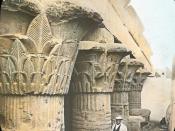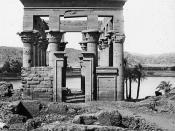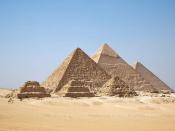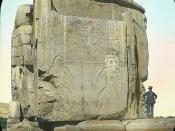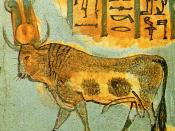The Ancient Egyptian civilization was one of the earliest civilizations in the world. Therefore, it had one of the earliest religions. The Ancient Egyptian religion, which beliefs were based on polytheism, helped to shape other religions presently practiced in Egypt. The ancient Egyptian religion came about to make sense of the changing atmospheric conditions surrounding the people.
Egypt is the northeastern most country in Africa. To the north is the Mediterranean Sea and to the East is the Sinai peninsula. In ancient times, there were three parts of Egypt. There was Lower Egypt located right below the Mediterranean, Middle Egypt below that, and Upper Egypt, the southern most territory, until 1500 B.C. when Egypt expanded to the south and took over Kush. All of the villages were set up along the Nile river because of the fertile soil, water and other food it provided. Each of these villages had there own set of governing laws, therefore had differing gods because of their different locations.
"Polytheism is the belief in a plurality of gods in which each deity is distinguished by special functions." (Columbia Electronic Encyclopedia) Many cultures have practiced this type of worship over the centuries, the most notable being Greece. "The Olympian Zeus, originally a sky god, became the titular head and most powerful of all Olympian deities; the Egyptian Ra was the original, self-generating and supreme deity; and the Vedic gods of India, once numbering several thousand, were gradually displaced by the trinity of Vishnu, Shiva, and Brahma." (Columbia Electronic Encyclopedia) The first occurrence of polytheism in organized society is unknown, however, this practice is still going on today. These current practices are referred to as neopaganism and polytheistic reconstructionism. Most of the polytheistic practitioners were in the eastern hemisphere before the Americas were discovered. In today's society though, polytheism could be found anywhere on the globe.
The Egyptians developed a belief system to help "explain the creation of humankind, and other natural phenomena." (Oakes 265) All of these villages had ninety-four gods and goddesses combined. However, the more populated cities had around twelve gods and less populated cities had three (forming a triad) or more. Each god/goddess had specific duties that they were 'assigned.' For example, Amun-Ra was the sun god and was also revered as the creator or the King of gods.
The image of the gods suited there purpose. Anubis, associated with cemeteries and embalming, was depicted as a jackal or as a man with the head of a jackal. "Since jackals were common scavengers... Anubis... may have" (Oakes 281) protected the mummies from desecration. There were gods for the sun, for the dead and for many other things like fertility and war.
The first dynasty in Egypt began around 3150 B.C. and their belief system developed around the same time. This belief system lasted for over three centuries until a bout 31 B.C. when the Romans invaded and with them came Christianity. Then Christianity began to diminish because of continuous revolts by the people and continuous wars and changing of Emperors in the late 200's early 300's A.D. Armies of Arabs advanced rapidly from Palestine and conquered Egypt in 646 A.D. These events ended 975 years of Greco-Roman rule over Egypt.
"Islam is a monotheistic Abrahamic religion originating with the teachings of the Islamic prophet Mohammed, a seventh century Arab religious and political figure. The word Islam means "submission", or the total surrender of oneself to God." (USC-MSA Compendium of Muslim Texts)Egypt had a strong empire and a wide expanse of land for 3119 years. However, Romans decided to invade and Egypt did not put up a strong fight. When the Romans made Egypt one of its provinces, they brought along their religion, Christianity. While the Egyptians were not prosecuted for being polytheistic, the influence of Christianity and monotheism prevailed. "Christianity is a monotheistic religion. Christianity is centered on the life and teachings of Jesus of Nazareth as presented in the New Testament. As of the early 21st century, it has between 1.5 billion and 2.1 billion adherents, representing about a quarter to a third of the world's population." (Columbia Electronic Encyclopedia) Today Egypt, North African countries and the Middle East practice Islam as the primary religion.
There are more than 1 billion Muslims worldwide, fewer than one fifth of whom are Arab. Islam is the principal religion of much of Asia, including Indonesia (which has the world's largest Muslim population), Malaysia, Pakistan, Bangladesh, Afghanistan, Azerbaijan, Turkmenistan, Uzbekistan, Tajikistan, Kyrgyzstan, Kazakhstan, Iran, Iraq, Syria, Jordan, the Arabian Peninsula states, and Turkey. India also has one of the world's largest Muslim populations, although Islam is not the principal religion there. In Africa, Islam is the principal religion in Egypt, Algeria, Tunisia, Djibouti, Gambia, Guinea, Libya, Mali, Mauritania, Morocco, Niger, Senegal, Somalia, and Sudan, with sizable populations also in Chad, Eritrea, Ethiopia, Ghana, Tanzania (where the island of Zanzibar is predominantly Muslim), and Nigeria. (Columbia Electronic Encyclopedia)Islam dictates that Polytheism is blasphemous, resulting in its followers being persecuted.
I have been fascinated with polytheism for a long time. It is probably because of my love of Egypt, its history culture and architecture. Particularly structures such as the pyramids and the Sphinx. Many northeastern states practice neopaganism which is similar to polytheism in that they also have many deities to which they worship. The practice of polytheism is as complex as it is ancient. After doing this research, I think it is fair to say that to fully understand the subject matter could take years.
Some aspects that I like about polytheism is the way that a person can have more than one god so as not to put all of your trust in one supreme being. The idea that one god can be so powerful is, honestly, slightly frightening. Polytheism makes sense to me. It seems to me that many gods is better than just one because they can all watch over me. For instance, for certain activities I can rely on one god more than another because that god specializes in that certain activity. I also like the philosophy of the afterlife which I think coincides with polytheism. In Egypt the people buried their Pharoes with worldly possessions and guards and cats to protect them and to be safe in the afterlife. This suggests that the afterlife is something like the here and now, only so much sweeter to have all of those possessions unperishable and to always have protection.
Personally, I believe that science explains all the world's and universes' natural phenomena. Science can even explain the sensation of 'love' with an in-depth analysis of pheromones. Another phenomena, 'faith,' can scientifically be explained as.... Well, I think further study is needed in theology, or other various subjects pertaining to religion, for me to come up with a scientific explanation of faith. For me, polytheism is something to make me happy and something that I can really appreciate for what it was and for what it represented.
Works CitedChristianity. Reference.com. Columbia Electronic Encyclopedia. Columbia University Press. http://www.reference.com/browse/columbia/Christia (accessed: April 29, 2008).
Gibbon, Edward. History of the Decline and Fall of the Roman Empire. 1996.
Oakes, Lorna, and Lucia Gahlin. Ancient Egypt. New York City, N.Y.: Hermes House, 2002.
Polytheism. Reference.com. Columbia Electronic Encyclopedia. Columbia University Press. http://www.reference.com/browse/columbia/polythei (accessed: April 28, 2008).
U.S.C. "Compendium of Muslim Texts." (2008). http://www.usc.edu/dept/MSA/notislam/misconceptions.html#HEADING1 (29 April 2008).
